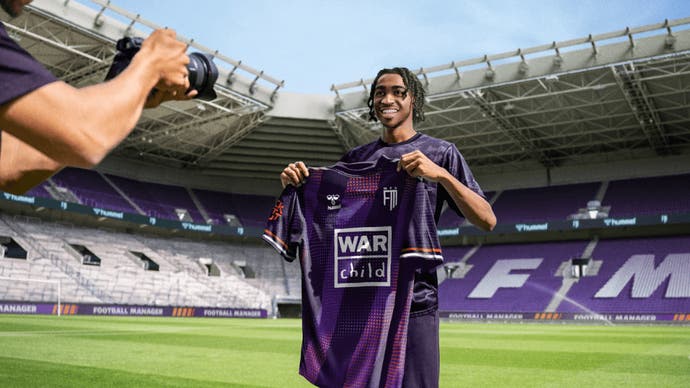"FM25 is not a continuation of FM24" - the big Football Manager interview
Sports Interactive gaffer Miles Jacobson on Game Pass, AI, the Premier League - and why some features had to go.
"Things- things are good," Miles Jacobson tells me, before a pause. "We've taken on a lot, with FM25."
It's early August, late in the afternoon on a Friday, and it's clearly been a long week for Jacobson, head of Football Manager developer Sports Interactive. The studio celebrates its 30th anniversary this year, the same year it aims to reinvent the series with the most significant changes for two decades, but it's noticeable that Jacobson is seeking to ease some expectations for FM25 as we begin to talk.
"What I don't want to do is be sitting here and be overhyping things," he says, "because I don't think it helps anyone."
In fact, keeping the hype in check is a recurring theme throughout our conversation. "This is something that's really important for us to try and get people to understand," he says, "and I'm talking journalists as well as consumers, because maybe we weren't as-" he catches himself and self-corrects, "I think we were clear, but I'm not sure that the message is getting out there fully: FM25 is not a continuation of FM24. FM 25 is: 'This is the next generation of Football Manager' - and this is the first chapter in the new book of Football Manager, and will get expanded on.
"If people are expecting FM24 plus, plus, plus, plus, plus, they're not going to be getting that with FM25."
If regular players have been following the news closely, some of that may well have filtered through. Earlier in the summer, Sports Interactive's first blog on FM25 revealed as much about what wouldn't be making it to the new entry as what would. The social media screen is out; the data chalkboard is out; modes such as Create-a-Club, Challenge Mode, Versus Mode, Fantasy Draft are out too, with returns lined up for some of those over time. One of the biggest, announced at the start of September after we spoke - alongside a slight delay, from its usual early November release to later that month - is the removal of international management this year.
"We've looked really hard at international management in FM and determined that what we were planning to deliver wouldn't reach our initial quality threshold," Jacobson wrote in the development blog. "International management will return in a much more feature-rich way to FM26, FM26 Console and FM26 Touch."
Many of these are based on player data that showed they were very rarely used as modes - Challenge Mode and Versus Mode, for instance, were both played by less than 0.5 percent of FM's audience, and international management 5.6 percent ("which we feel validates our view that we need to do much, much better with the experience," as Jacobson wrote). Others such as social media and the data chalkboard have replacements of sorts in other in-game screens as well. But a couple of other big changes are more surprising.
One of those is the removal of touchline shouts, the in-game commands you can issue to (in theory) motivate your team, calm them down, fire them up, and so on. These are pretty prominent part of the in-match experience - personally, I use these almost every game, and they're also a much-loved meme in the community: a 4-2-3-1 Gegenpress and hammering "Demand More" is ever the winning combo. Jacobson is keen to explain why the function had to go this time.
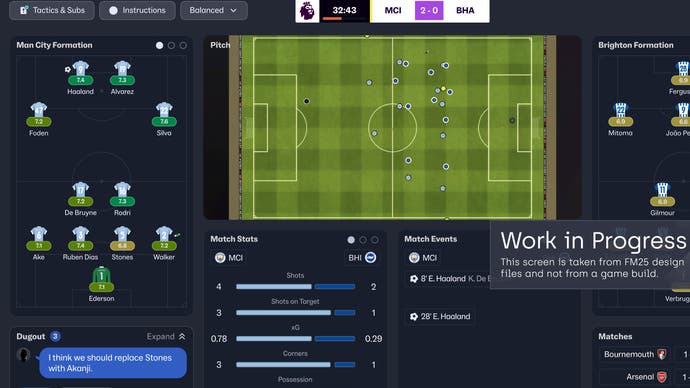
"The reason we're taking it out, and I'm going to use strong language here," he says, before catching himself again. "I'm going to tone it down a little bit from what I was going to say: it wasn't good enough. It's not up to our standards, it didn't work the way that consumers thought it worked," he continues. "So when we're looking at that and going, well, do we port something across from our old game that isn't good enough? The answer is 'no'."
Doing so, Jacobson explains, "would take one of our best technology teams one, two, three cycles" to get working to the team's standards. "Are we better off having all of their time spent working on getting that done?"
The other headline change - and surely the most immediately noticeable for anyone who's played Football Manager before - is the removal of the Inbox. For the uninitiated, the Inbox is really your main interface with the game, the place where you receive notifications on everything from injuries to transfer negotiations and, as the primary delivery system of 'to-do' tasks like picking squads for upcoming matches, is the main driving factor of what you actually do from moment to moment before clicking that big 'Continue' button to advance time. That's gone in FM25.
"You are still pressing Continue to move the game on," Jacobson reassures me, "we haven't gone real-time, we're still turn-based with what you do." Likewise you still get "messages" in the game, he says, but: "it's very rare that you see a football manager with a laptop" in the real game. "They've got their tablet, and they've got their phone, so we wanted to move into that more. The football world never really had email!"
Instead, Sports Interactive wants to "be doing things the same way that managers do, which is lots of messages via WhatsApp, and lots of conversations - but we also know that conversations are very difficult to do in video games." Instead of email, then, FM25 will have what Jacobson calls the "portal system", with the portal screen now "the most important screen in the game... that's where you're going to be doing stuff from, that is the manager's office. That is where you decide: now I'm going to go to the training ground and coach training, now I'm going to go and look at the tactics boards and go and do the 'on-pitch' stuff."
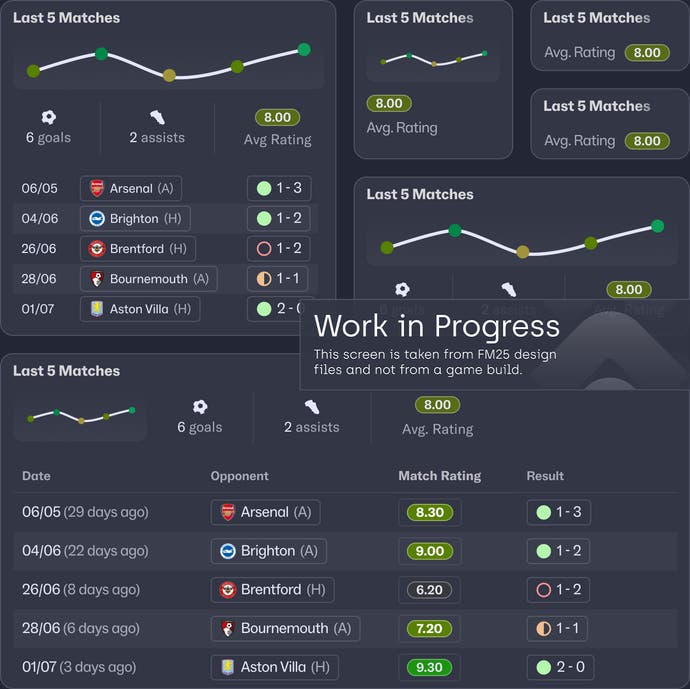
The "core loop," as he describes it, "that is Football Manager - it looks different. And it does play a little bit differently. But it's still the core loop. You're still reacting to information, you're being told the news that you're being given. And there are just different ways of interacting with it now."
It's interesting to hear Jacobson be keen to offer some reassurance here. Football Manager, given the sheer longevity of it, is a game many players play from sheer muscle memory, be that keyboard shortcuts or simply hovering over the little information "i" symbols, or going through specific, passively-memorised loops of the UI.
"There is a lot of muscle memory involved," he says. "And some of that muscle memory is going to have to be relearned. Some people are going to pick it up straight away, and for some, it's going to be a curve." He mentions bringing some community members into the studio in September to test out the new UI - to get their impressions, of course, but also to find out how long it actually takes players to get used to it, and whether or not that's too long or, curiously, not long enough.
"There are lots of things in the game that take a lot of time to get used to," Jacobson says, "but how rewarding is it when you're used to them and you understand their power and you're using them? For me that's the really exciting side of things, because I don't want everyone to discover everything that's in Football Manager in the first two hours of them playing it. I want them to be discovering stuff 500 hours in, 750 hours in. Going: 'Where's that come from?!' That's what's led to the longevity of what we do."
Much of those big departures from classic Football Manager-isms come from the one truly foundational change Sports Interactive is making this year, in moving away from its own, long-utilised proprietary engine built internally, to the third-party engine Unity. It's something the studio has "been working on for a while; we've known we're going to do it for a while," Jacobson says. But these things are never easy.
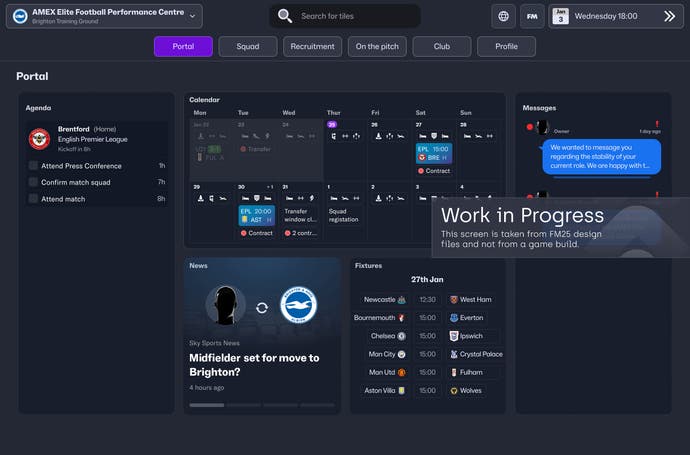
"When you move to an engine, there are lots of 'known unknowns', and there are lots of 'unknown unknowns'." What that means, in development terms, is changing scope. Some of those scope changes come in the form of those aforementioned cuts this year. But other changes have continued to be up in the air even well into August, around three months before Football Manager's usual November window of release.
"The team at Sports Interactive couldn't be working harder, they've been doing an absolutely incredible job, but we've had to look at scope maybe more than we thought we were going to have to last year," Jacobson says. "We've still got that premise of: if we had our time again, would we do it differently? And we've got the premise of: if we had our time again, would we do it at all?" Both questions Jacobson mentioned in our discussion last year about the big move.
"There then became another part of that, which is: do we actually have time to do this again properly for this version? And then what decision we have to make on that."
Jacobson is wary of giving away too many specifics as we talk, in part because, as he emphasises, much of the decisions are yet to be finalised. "Sometimes it's how things work; sometimes it's whether things are displayed; and sometimes it's how things are displayed."
Those dilemmas come up regularly, with "big debates" at the studio both amongst the team and between Jacobson and the wider team. "Whenever you're developing anything, you have to pivot at points. It doesn't matter how good your game documentation - or your game design documentation - is at the start of the process, or how great the feature set is at the start of the process, you are always going to have to de-scope at points.
"It's not only de-scope. Sometimes it's re-scope, and sometimes up-scope." One example Jacobson did share was the new UI itself, a system of "tiles" and "cards" which, he tells me, the studio had initially aimed to make identical across all platforms, from PC to console and even Netflix or Apple Arcade on mobiles. In the end, those plans have changed quite considerably, with the mobile platforms staying on the old engine for now and moving to Unity with later editions down the line.
"I've de-scoped something today," he says, "that at the time of the [June] dev blog was still in scope. And we re-scoped something last week, and we up-scoped something last week - it's a very fluid process!"
Has there been a specific obstacle, or specific reason there's been so much change on the fly? "I can answer that easily," Jacboson says, "it's our ambition. We are one of the most ambitious dev studios you will find out there - and I know that some people will find that difficult to believe because 'Oh, they only work on iterations, they're making the same bloody game every year'.
"We're trying to improve what is already an awesome game, every year it's what we've tried to do historically. And now, being our harshest critics, we've been looking at all going, 'Well is this actually good enough? It's this part here good enough, to our standards?'"
Another challenge: "the amount of screens that we have in the game. You know, we're not talking 50 screens, not talking 100 screens. You're talking over 500 screens that we had to look at and work out what we were going to do with [regarding] all the data that was on there."
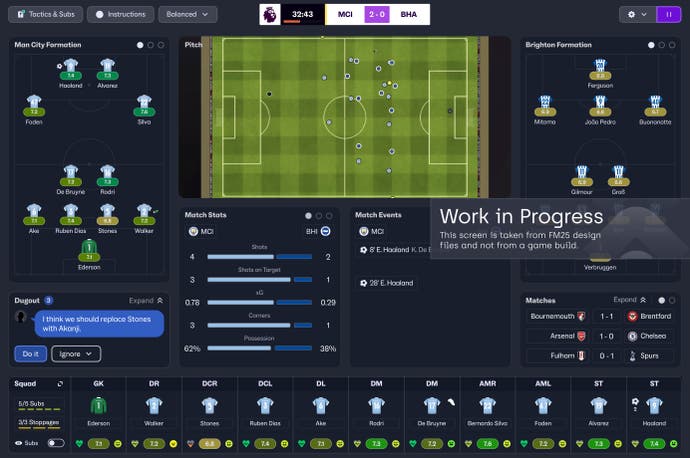
On the topic of large amounts of recurring screens, press conferences, a long-time staple of the series - and sticking point for some, as questions and their related multiple-choice answers begin to repeat on you as playtime extends through the seasons - are an issue that comes up. "There are people out there going, 'Why can't you just get generative AI to do the press conferences, to go through the game and come up with all the questions and then you answer them in whatever way you want to, and then [the in-game journalists and players] are going to react to that?'
"That's something that generative AI is not capable of, and anyone who's ever used a chatbot will know that it's not capable of doing that, and would also go so ridiculously off-piste and be impossible to QA. And impossible to get signed off by legal. And impossible to get signed off by licencing. So we're not using it in this way."
The team "has been looking at ways that we can use AI," however, but that's because "our whole match engine is AI; AI is not new to us." Speaking more broadly, Jacobson adds, "I do think that generative AI has a lot of good uses in the world, and for games as well, but I strongly believe in 'ethical AI', which is using generative AI in a way that isn't going to cost anyone their job."
For all the talk of what hasn't made it into the game this year, there are, thankfully, some big new features coming. Typically, Jacobson is only willing to talk about these "off the record" at the time of our conversation - in part because of that ever-changing scope, which is also part of why the studio is keeping its reveals for much closer to launch than in previous years. But he's happy to talk about one of Sports Interactive's biggest wins in recent times, in its first ever landing of the official Premier League licence. When did it first look like it was finally going to happen?
"Two and a half years ago," Jacobson says, right away. "It's 20 years since we've spoken to them about it - that includes me putting on a charity dinner each year alongside the Premier League," he adds, where a lot of effort was spent building a relationship. "We've been working together for a long time on a lot of things. But the original conversation on the licence was a couple of years ago, it was during the pandemic."
Jacobson received a call from someone at the Premier League, effectively asking, in his words, "So if this was possible, would you be interested? And if you were interested, how much would you be interested?" He gave them a figure in response, "and they laughed."
"They said 'Well, we were thinking 10 times that number.'"
After some back and forth, for some time longer, the two agreed a deal. "A huge effort has gone in over a very long amount of time," Jacobson says, "but yeah, delighted to have that one - and it's not the only new licence that we have for FM25."
That licence is now shared, with the likes of fellow football series EA Sports FC 25 and others. Notably, EAFC has introduced a range of distinctly Football Manager-like features this year, in its revamped tactics system dubbed FC IQ. It features, amongst other things, a new take on formations that brings in a system called Player Roles - a term that'll be familiar to FM players - that goes as far as to use some closely overlapping concepts and terms, such as 'deep-lying playmakers' in defensive midfield.
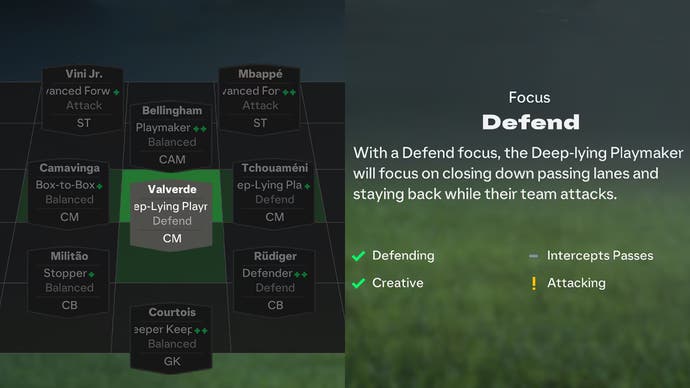
"Look, I think the EAFC team is awesome, I'm a fan of their work," Jacobson says, when I ask him what he made of the reveal. "There are things that we actually couldn't have done this year without their help. You know, we've made one big licence announcement - that's a licence that has always been exclusive to one partner," meaning EA Sports.
"They could probably have quite easily asked for that to still be the case. But that's not the case. That particular licence, the Premier League licence, is with both us and EAFC" In Jacobson's eyes the two developers "will complement each other" by sharing it. "So I don't see EAFC as rivals, I think they're a really different game. I think it's in the same way as there are lots of games with guns, but some of those games are first-person shooters and some are tactical, and those are very different genres of game."
As for the overlap in terms, "we were influenced by the behind-the-scenes of the football world, when we put player roles in," he says. "The same year that we had them in for the first time, it was actually Gary Neville who started popularising them on Monday Night Football. He started talking about them literally just before we announced them, so we looked super smart by him talking about 'deep-lying playmakers' and things like that," he laughs.
"It's a term that's been in football for a long time, so we've helped popularise those, as have a lot of other football journalists that have been out there who've started bringing those into the parlance. So the fact that EA is doing them now, it's not copying Football Manager, what they're doing; it's bringing them in line with the rest of the football world." So, he continues, "good luck to them for doing it - they didn't use the exact same terms that we use in most cases, so that's good!"
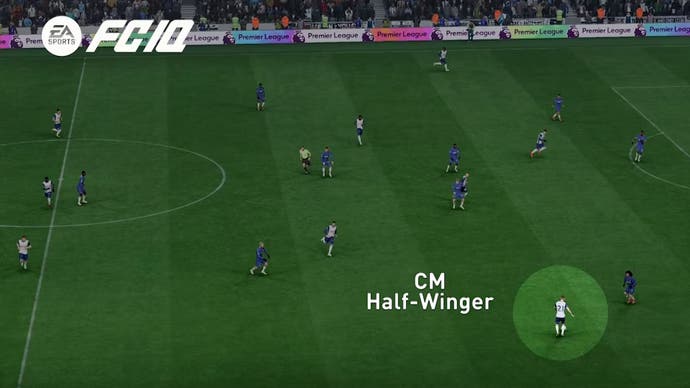
Back to Football Manager, and in those 30 years of development at Sports Interactive (plus three more before then, when it was still made in a bedroom by the two founding brothers, Paul and Oliver Collyer), Jacobson emphasises the amount it had to adapt to survive. For him a huge factor in its growth, from around a million players a decade ago to over 11 million now, has been Football Manager's early presence on subscription platforms such as Game Pass, on which it debuted with FM19 in the summer of 2019, as well as more recently Netflix Games and Apple Arcade. There's a personal anecdote that's partially behind the decision.
"So, 2012 or 2013 - I can't remember exactly which year it was," Jacobson tells me, "we had a year where anyone who was pirating Football Manager, it phoned home. And we knew, and we had their IP addresses." Rather than doing anything to "shut it all down," he says, "we took all of that data and we worked with a load of people, and got it verified by a university as well, to work out what our actual loss of sales were."
The studio realised it had "more than 10 million players on the game then, but 9 million of them are pirating it, and how many of those would have actually bought it?" It turned out to be "a pretty small number," Jacobson said, because they either couldn't afford to, or were young kids "still swapping stuff in playgrounds".
This brings Jacobson onto what, at least in part, convinced the studio to take a punt on the subscription services. "When I was first playing games, one of my friends had a double tape deck and each of us would buy one Spectrum game a month. And the guy with the double tape deck would make 90 minute tapes so that we had copies of all the games," he explains.
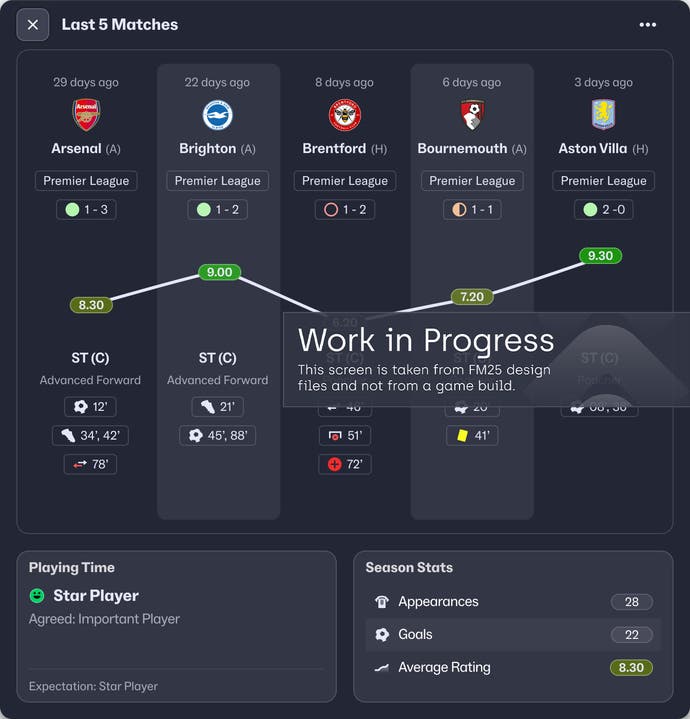
"Now, that was wrong. But I wouldn't have got to play those games without it, because I didn't even have the money to buy one game a month." That led, he says, to his decades spent working in the industry, and ultimately "spending a large amount of money on buying games when I did have money." Off the back of those kinds of stories, the studio made the decision to "not make the same mistakes that the music industry and film industry made" at the dawn of streaming and digital platforms. "So it's not an accident we're on Game Pass, and Apple Arcade, and Netflix," Jacobson says, "and it's not an accident we have 11 million players."
Is the studio making as much money as it would if it was selling 11 million copies? No. But then as Jacobson puts it, it wouldn't have sold those copies anyway. "A million's a lot of people - but it's not 10 million." All of the platforms Football Manager is on, meanwhile, are still "on an upward trajectory" in terms of sales.
Change, then, has been at the heart of Football Manager's success throughout its three decades, from the old Championship Manager days up until now. This year sounds like one of the very biggest changes it's made, and judging from my conversation with Jacobson, probably one of the most challenging to get right as well. But what's clear is the studio sees it as necessary.
"Everybody says that they want change, right?" Jacobson says. "People are kind of scared of it at the same time and, when change happens, will sometimes react to it negatively just because it's not what they know. So, 'we want change' and then you deliver change, and then, 'well we didn't want this much change!'" he laughs.
Jacobson likens the series, in that respect, to long-running franchises like Star Wars or the Marvel Cinematic Universe. "It's a similar dilemma... and people who are working on soap operas - those things that are comfortable that are in your home.
"When Eastenders changed the cameras that they were using, I'm sure there were lots of people out there who go: 'Oh my god it's not the same, this is really bad!' And then got used to it and realised it was better. So it's that weird-" he catches himself, another pause.
"It's been a difficult year. I'll say that over and over and over again-" Jacobson interrupts himself one more time and, a little wryly, adds: "It's been a great learning experience!"
